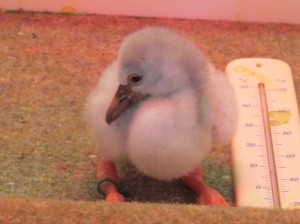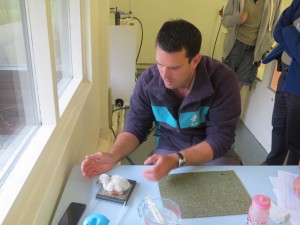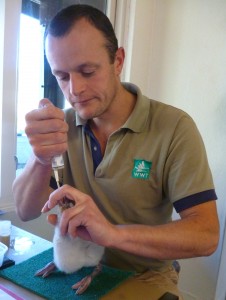Hatchin' action as flamingo chicks are hand-reared
Chilean flamingo chicks are once again being hand-reared at WWT Washington Wetland Centre.

Following last September’s pioneering project - which saw juvenile flamingos, Frankie, Nico, Phil, Flo and Fran, successfully hand-reared and integrated into the wetland reserve’s adult flock for the first time - aviculture expert Owen Joiner is now playing dad to a new clutch of fluffy youngsters.
But with 25 chicks this time around – that’s five times as many mouths to feed! – a team of dedicated volunteers has been drafted in and trained up to help care for the bumper brood.
The flamingos were transported to the North East in mobile incubators last month while still inside their eggs and came from the Wildfowl & Wetlands Trust’s (WWT’s) headquarters at WWT Slimbridge in Gloucestershire, WWT Martin Mere in Lancashire and Chester Zoo.
They will eventually join WWT Washington’s and WWT Martin Mere’s resident birds next spring, as part of a strategy to increase flock size and enhance chances of future breeding success.
WWT Washington’s captive animal manager Owen Joiner explained: “In the wild, flamingos nest in large groups, with potentially thousands of birds breeding together. These crowded conditions stimulate natural breeding by giving the birds a sense of stability and confidence.

“Our own flock of Chilean flamingos failed to produce eggs for the sixth season running this year, despite a noticeable increase in displaying, flirting, mating and nest-building thanks to the introduction of last year’s five hand-reared juveniles in May.
“By adding even more new chicks, we should hopefully finally stimulate the existing adults into laying eggs, while at the same time increasing the flock size and adding young birds that will hopefully breed themselves in a few years time."
Because the eggs were laid so late in the season, it was too risky to allow the flamingos to parent-rear due to colder weather and lack of essential sunlight.
So the expert skills and knowledge of Owen and his volunteers is being called upon instead, for the difficult but rewarding task of raising the chicks by hand.
“Hand rearing flamingos is a delicate matter”, said Owen. “And this year’s challenge is even greater as we have 25 chicks to look after, so we have trained up a team of dedicated volunteers to help with their care.

“Flamingo parents feed their young with a type of rich saliva, full of all the goodness needed for the chicks to develop. Here, we mimic that by syringe-feeding them every two-three hours with a blended mixture of baby porridge, sardines in oil and egg yolks.
“They also need regular exercise, precise health checks and growth monitoring, to protect their delicate legs as they grow, in case they become too heavy for them.
“At this time of year, lack of sunlight is an issue too, because the chicks need Vitamin D in order to grow and develop properly but can’t be exposed to the cold for too long, so we’ll be supervising ‘sunbathing’ sessions for them when the weather is warm enough.
“Thankfully the hard work and perseverance is paying off so far and all 25 are thriving up at our duckery.”
Visitors can see the chicks throughout the day in their rearing units and can watch the 1pm feed through the glass.
Graham Clarkson, WWT’s Captive Animal Manager, added: “Excellent cooperation and hard work between WWT centres and Chester Zoo (a BIAZA partner) has been essential in getting this important project underway.
“Chilean flamingos are a near-threatened species and conservation breeding programmes such as this help develop vital staff skills for re-introduction and head-starting projects for endangered birds, such as Madagascar pochards, spoon-billed sandpipers and Eurasian cranes”.
“The skills and techniques developed by breeding captive flamingos can also pay dividends to wild populations. For example, building artificial nest mounds for wild flamingos has been used with great success at sites in Europe and Africa, where tens of thousands of wild flamingos have hatched directly as a result of this technique pioneered in captivity.
“We are delighted with progress at WWT Washington so far and are anticipating as good an outcome to our hard work as last year, when we reared five Chilean flamingos.
“Most of the youngsters will be staying here at WWT Washington permanently, with some moving to Martin Mere, in Lancashire, in the spring to join the colony there.”



